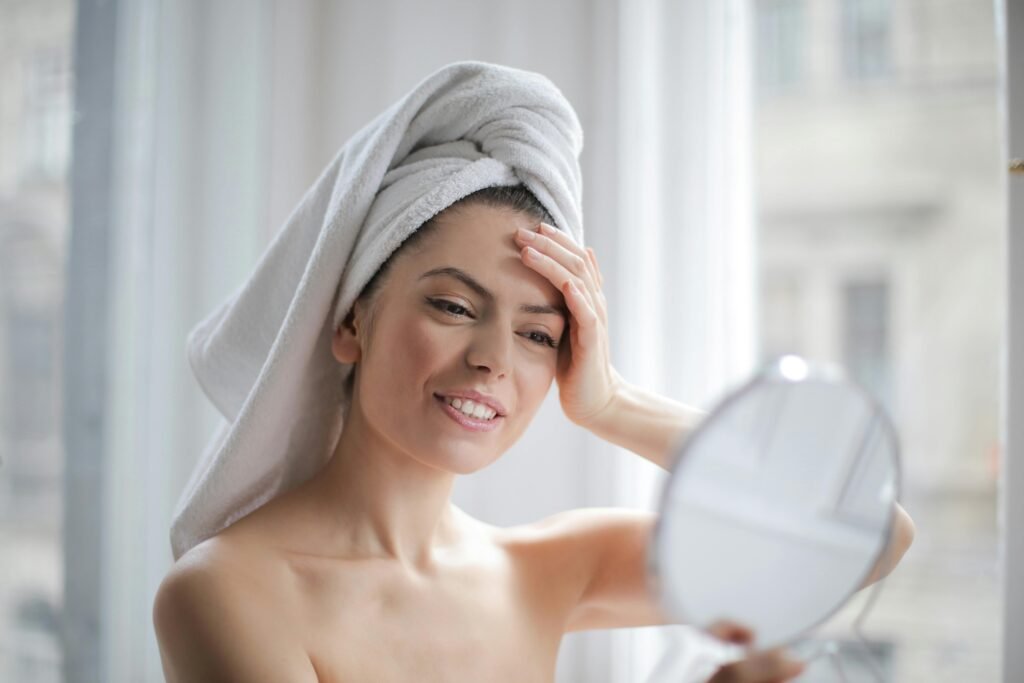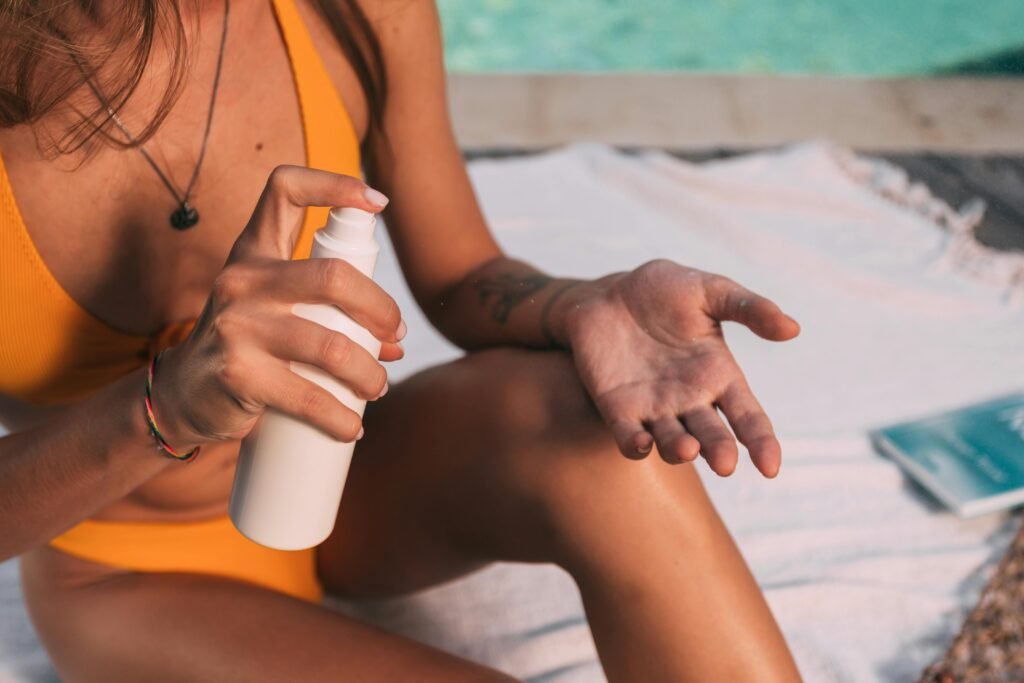Hey there, beautiful souls and radiant complexions! 🌟 Ready to dive into the wild world of skincare myths? Buckle up, because we’re about to unravel the mysteries of the beauty universe and expose the misconceptions lurking in your bathroom cabinets.
Imagine your skincare routine as a Netflix series – it’s got drama, comedy, and a cast of characters that can be as confusing as a plot twist in a telenovela. But fear not, fellow skincare enthusiasts! We’re here to bring some clarity to the chaos, separate fact from fiction, and maybe even make you snort your coffee with a dash of humor along the way.

So, grab your favorite sheet mask, put on your reading glasses (or just squint really hard – we don’t judge), and get ready for a skincare journey that’s more enlightening than your aunt’s conspiracy theories at Thanksgiving dinner. It’s time to bust those beauty myths wide open! 💄💥
In the pursuit of flawless skin, the world of skincare often feels like a labyrinth, with countless products, routines, and advice promising the coveted glow. Skincare isn’t just about aesthetics; it’s a ritual that directly impacts our well-being. However, amid the vast array of information, there exists a prevalent issue – the prevalence of misconceptions in the skincare industry.
Our journey toward optimal skin health is often hindered by well-intentioned but misguided advice. Whether it’s the belief that “natural” products are always superior, the misconception that cost equates to effectiveness, or the persistent myth that oily skin requires no moisturizing, these misunderstandings can lead us down a rabbit hole of ineffective practices.
This blog aims to unravel the tangled web of skincare misconception, providing clarity on common myths that could potentially harm rather than nurture our skin. As we delve into the nuances of these fallacies, we’ll uncover the truth behind effective skincare practices, ultimately empowering you to make informed decisions tailored to your skin’s unique needs. So, let’s embark on this journey to demystify skincare and discover the keys to a healthier, more radiant complexion.
Misconception 1: “Natural” is Always Better:
In the pursuit of healthier skin, the allure of natural products is undeniable. Many of us have fallen prey to the belief that if a skincare product is labeled as “natural” or “organic,” it must be superior. However, this misconception can be misleading and potentially detrimental to our skin.
The Pitfall of Blind Faith:
Natural doesn’t always equate to better. In fact, some of the most potent skincare ingredients are synthesized to ensure stability and efficacy. Blindly trusting in the natural label may lead to overlooking scientifically formulated products that could offer more targeted and reliable results.

Potential Drawbacks of Natural Ingredients:
While some natural ingredients boast undeniable benefits, others may pose risks. For instance, essential oils, often celebrated for their aromatic properties, can be irritating to sensitive skin and may even cause allergic reactions. Additionally, the potency of certain natural extracts might be too harsh for regular use, leading to unintended consequences like dryness or redness.
Understanding Ingredients:
To make informed decisions about skincare, it’s crucial to understand the ingredients listed on product labels. Rather than relying solely on the “natural” tag, take the time to research specific components. This includes being aware of potential allergens, irritants, or ingredients that may interact negatively with your skin type.
The Role of Science in Skincare:
Advancements in skincare science have led to the development of synthetic compounds that mimic or enhance the benefits of natural ingredients. Embracing both natural and synthetic components can provide a balanced approach, ensuring that your skincare routine is effective, stable, and tailored to your skin’s unique needs.
In conclusion, while natural ingredients have their merits, assuming they are always better oversimplifies the complex world of skincare. By understanding the nuances of different components, we empower ourselves to choose products that align with our skin goals, regardless of whether the source is natural or synthetic.
Misconception 2: More Expensive = More Effective:
In the world of skincare, the price tag attached to a product often becomes synonymous with its perceived effectiveness. The misconception that pricier skincare products are inherently better is widespread, perpetuating the notion that splurging equates to superior skin results. Let’s unravel this myth and shed light on what truly matters in skincare.
The Price-Effectiveness Paradox:
While it’s true that some high-end skincare products come with a hefty price tag, assuming that cost directly correlates with effectiveness oversimplifies the complex world of skincare formulations. Price is influenced by various factors, including brand reputation, marketing, and packaging, rather than solely the quality of ingredients.
Ingredients Take Center Stage:
Effective skincare isn’t about the price you pay; it’s about the ingredients within the product. Understanding the key components that address your specific skin concerns is paramount. A product may be budget-friendly and still boast a powerful combination of ingredients that rival or surpass more expensive alternatives.

Individual Skin Needs Matter:
Skincare is not a one-size-fits-all endeavor. Each person’s skin is unique, with distinct needs and concerns. What works wonders for one individual may not yield the same results for another. Tailoring your skincare routine to address your specific skin type, concerns, and goals is far more crucial than investing in high-end products that may not align with your skin’s requirements.
Demystifying Luxury Ingredients:
Luxury ingredients, often associated with higher-priced products, might not necessarily be more effective for everyone. Some individuals may find that more affordable alternatives, containing well-researched and proven ingredients, deliver comparable or even superior results.
In conclusion, the belief that more expensive skincare products are inherently better is a misconception that can lead to unnecessary overspending. By prioritizing ingredient knowledge, understanding your skin’s unique needs, and embracing a personalized approach to skincare, you can achieve effective results without breaking the bank. Remember, the true value lies in the science and formulation behind the product, not just the price on the shelf.
Misconception 3: Oily Skin Doesn’t Need Moisturizing:
The belief that moisturizing is unnecessary for individuals with oily skin is a persistent myth that can lead to counterproductive skincare habits. In reality, moisturizing is a crucial step for all skin types, including those prone to excess oiliness. Let’s explore the reasons behind this misconception and debunk the idea that skipping moisturizer can reduce oiliness.
Understanding Oily Skin:
Oily skin is characterized by an overproduction of sebum, the skin’s natural oil. Many individuals with oily skin tend to believe that adding more moisture will exacerbate their oiliness, leading them to skip the moisturizing step in their skincare routine.
The Importance of Moisturizing:
Contrary to popular belief, moisturizing is essential for oily skin. Depriving oily skin of proper hydration can trigger the skin to produce even more oil to compensate for the lack of moisture. This can create a vicious cycle, as excess oil can contribute to clogged pores and acne.

Balancing Act:
The key is to find a lightweight, oil-free moisturizer that provides hydration without clogging pores. These moisturizers help balance the skin’s oil production and maintain a healthy moisture barrier. Ingredients like hyaluronic acid, glycerin, and non-comedogenic oils can offer the necessary hydration without causing breakouts.
Debunking the Myth:
Skipping moisturizer does not reduce oiliness; in fact, it can exacerbate the issue. When the skin lacks proper hydration, it may respond by producing more oil to compensate, leading to increased shininess and potential breakouts. By incorporating a suitable moisturizer into your skincare routine, you help regulate oil production and promote overall skin health.
Tips for Oily Skin Moisturizing:
- Opt for oil-free, non-comedogenic moisturizers.
- Use water-based or gel formulations for a lightweight feel.
- Moisturize twice daily, especially after cleansing.
- Consider incorporating mattifying products into your routine to control shine.
In conclusion, moisturizing is a universal step in skincare that benefits all skin types, including oily skin. By debunking the myth that skipping moisturizer reduces oiliness, individuals can embrace a balanced skincare routine that promotes healthy, well-hydrated skin without exacerbating oil production.
Misconception 4: Exfoliate Daily for Smooth Skin:
The belief that daily exfoliation leads to smoother, radiant skin is a common misconception that can have adverse effects on your skin’s health. While exfoliation is a crucial step in any skincare routine, the frequency and method matter significantly. Let’s explore why the idea of daily exfoliation is misguided, the potential harm it can cause, and how to adopt a balanced approach for optimal skin benefits.
Understanding Exfoliation:
Exfoliation involves removing dead skin cells from the surface to reveal fresher, smoother skin underneath. This process can improve texture, unclog pores, and enhance the absorption of other skincare products.
The Pitfalls of Daily Exfoliation:
Exfoliating daily, however, can strip the skin of its natural oils, disrupt the skin barrier, and lead to sensitivity. Over-exfoliation may exacerbate existing skin concerns, causing redness, dryness, and increased vulnerability to environmental stressors.

Potential Harm to the Skin:
- Microtears: Daily exfoliation, especially with abrasive physical scrubs, can create microtears in the skin, compromising its protective barrier and making it more susceptible to irritation and infection.
- Overstimulation: Continuous exfoliation may overstimulate the production of new skin cells, leading to a thinning of the skin barrier and increased sensitivity.
- Unbalanced pH: Excessive exfoliation can disrupt the skin’s natural pH balance, making it more challenging for the skin to protect itself from harmful bacteria and environmental aggressors.
Recommendations for a Balanced Approach:
- Frequency: Instead of daily exfoliation, aim for 2-3 times a week, adjusting based on your skin’s tolerance.
- Choose the Right Exfoliant: Opt for chemical exfoliants like alpha hydroxy acids (AHAs) or beta hydroxy acids (BHAs) over abrasive physical scrubs. These ingredients provide effective exfoliation without the risk of microtears.
- Listen to Your Skin: Pay attention to how your skin reacts. If you notice signs of over-exfoliation such as redness, peeling, or increased sensitivity, cut back on the frequency.
- Moisturize and Protect: After exfoliation, ensure to moisturize and use sunscreen to protect your newly revealed skin from environmental damage.
In conclusion, the idea that daily exfoliation leads to smoother skin is a misconception that can harm the skin’s health. Adopting a balanced approach, considering your skin’s needs and using the right exfoliants in moderation, is key to achieving the desired benefits without compromising your skin’s integrity.
Misconception 5: Sunscreen Only on Sunny Days:
The myth that sunscreen is only necessary on sunny days is a common misconception that can have serious consequences for skin health. Sunscreen is a crucial element of skincare, and its use should be emphasized daily, irrespective of the weather conditions. Let’s delve into the importance of consistent sunscreen application and debunk the myth that sun damage only occurs on sunny days.
UV Rays: The Unseen Threat:
Ultraviolet (UV) rays emitted by the sun are a year-round concern, even on cloudy or overcast days. These rays penetrate the atmosphere, reaching the Earth’s surface regardless of the weather. UV radiation is a leading cause of premature aging, skin damage, and an increased risk of skin cancer.
Sun Damage Knows No Season:
Contrary to the belief that sun damage is limited to bright, sunny days, harmful UV rays are present throughout the entire year. Clouds may provide some filter, but they do not completely block UV radiation. Snow and water surfaces can also reflect UV rays, intensifying exposure and increasing the risk of damage.
Daily Sunscreen: A Non-Negotiable Step:
To protect the skin from the harmful effects of UV radiation, daily sunscreen application is essential. A broad-spectrum sunscreen with an SPF of 30 or higher helps shield the skin from both UVA and UVB rays. This protective barrier is crucial in preventing sunburn, premature aging, and reducing the risk of skin cancer.

Debunking the Myth: Sunscreen is for Every Day:
Waiting for a sunny day to apply sunscreen is akin to locking the door only when you expect a break-in. Consistent, daily use is the key to effective sun protection. Whether it’s a cloudy winter morning or a scorching summer afternoon, incorporating sunscreen into your daily routine is a non-negotiable step for maintaining healthy and resilient skin.
Tips for Effective Sunscreen Use:
- Apply sunscreen 15-30 minutes before sun exposure.
- Reapply every two hours, especially if swimming or sweating.
- Use a sufficient amount to cover all exposed skin.
- Don’t forget commonly overlooked areas like the ears, neck, and backs of hands.
In conclusion, the myth that sunscreen is only necessary on sunny days must be dispelled. Daily sunscreen application is a fundamental practice for preserving skin health and preventing long-term damage. By understanding that UV rays are a constant threat, individuals can embrace a proactive approach to sun protection, ensuring their skin remains shielded from harm year-round.
Misconception 6: Acne Means Dirty Skin:
The pervasive myth linking acne solely to poor hygiene oversimplifies a complex skin condition and contributes to unnecessary stigma. Acne is a multifactorial issue influenced by various factors beyond cleanliness. Let’s dispel the misconception and explore the true nature of acne, emphasizing proper skincare practices.
The Complex Nature of Acne:
Acne arises from a combination of factors, including genetics, hormonal fluctuations, and the overproduction of sebum. While keeping the skin clean is crucial, assuming that acne is solely caused by poor hygiene overlooks the intricate interplay of internal and external factors that contribute to its development.
Hormonal Influence:
Hormonal changes, especially during puberty, menstruation, or stress, can stimulate the sebaceous glands to produce more oil. This excess oil, along with dead skin cells, can clog hair follicles, leading to the formation of acne lesions. Hormonal imbalances, not cleanliness, play a significant role in these processes.

Genetic Predisposition:
Genetics also play a crucial role in acne development. If your parents or siblings experienced acne, you may be genetically predisposed to the condition. This genetic influence affects how your skin responds to hormonal changes and inflammation.
Proper Skincare Practices:
Maintaining good hygiene is an important aspect of skincare, but it is not a cure-all for acne. Over-cleansing or using harsh products can strip the skin of its natural oils, leading to increased oil production and potential irritation. A balanced approach involves gentle cleansing, suitable for your skin type, to remove excess oil and prevent pore congestion.
Preventing Acne: A Comprehensive Approach:
To manage acne effectively, adopt a holistic approach that addresses various contributing factors:
- Use non-comedogenic skincare products.
- Establish a consistent and gentle cleansing routine.
- Consider over-the-counter or prescribed treatments targeting acne.
- Consult a dermatologist for personalized advice and treatment plans.
Dispelling the Myth: Acne is Not a Result of Poor Hygiene:
Educating ourselves and others about the multifactorial nature of acne is crucial in dispelling the myth that associates acne with dirty skin. Understanding that acne is a complex condition influenced by genetics, hormones, and skincare practices encourages a more compassionate and informed perspective on those experiencing acne-related challenges.
Misconception 7: Skincare Routines Should Be Complex:
The belief that a successful skincare routine must be intricate, involving numerous steps and a multitude of products, is a common misconception that can lead to confusion and unnecessary expenses. Complexity doesn’t necessarily equate to effectiveness. Let’s unravel this myth and advocate for simplicity while emphasizing the importance of tailoring skincare routines to individual needs.
Quality Over Quantity:
More doesn’t always mean better when it comes to skincare. While the beauty industry often promotes extensive routines, the efficacy of a skincare routine lies in the quality of the products and their suitability for your skin type and concerns. Overloading your skin with numerous products may lead to irritation and undermine the effectiveness of each individual product.

Tailoring to Individual Needs:
Every person’s skin is unique, and a one-size-fits-all approach rarely works. Instead of blindly following a complex routine, focus on understanding your skin’s specific needs. Identify your skin type, concerns, and goals, and tailor your skincare routine accordingly. This personalized approach ensures that you address your skin’s unique requirements without unnecessary steps.
Simplicity and Consistency:
A simple and consistent skincare routine can often yield better results than a convoluted one. Cleansing, moisturizing, and sun protection are the foundational steps that benefit nearly everyone. Beyond these basics, incorporate targeted products based on your specific concerns, such as acne, hyperpigmentation, or aging. Consistency in your routine is key to seeing results over time.
Avoiding Product Overload:
Introducing too many products at once can make it challenging to identify which ones are truly beneficial for your skin. It’s advisable to gradually incorporate new products, allowing time to assess their impact. This approach helps you understand how each product contributes to your skincare goals.
Time and Budget Considerations:
A complex skincare routine can be time-consuming and expensive. Consider your lifestyle, available time, and budget when crafting your routine. A simplified routine that aligns with your resources is more likely to be sustainable and enjoyable in the long run.
Conclusion: Advocating for Simplicity:
In conclusion, the misconception that skincare routines should be complex is dispelled by emphasizing the principles of simplicity and tailoring to individual needs. A well-thought-out routine, focusing on quality products and personalized care, can be more effective and sustainable than a complex regimen. Strive for simplicity, consistency, and a routine that supports your skin’s unique journey to health and radiance.
Conclusion:
In our exploration of common skincare misconception, we’ve uncovered crucial insights that challenge prevailing myths and provide a foundation for a more informed approach to skincare. Let’s recap the key points and encourage readers to embark on a journey of understanding their unique skin requirements.
- “Natural” is Not Always Better:
- Natural products have merits, but their superiority is not universal.
- Understanding ingredients is crucial to making informed choices.
- More Expensive ≠ More Effective:
- Price doesn’t guarantee efficacy; ingredients matter more.
- Tailoring skincare to individual needs is essential for cost-effective results.
- Oily Skin Needs Moisturizing:
- Moisturizing is vital for all skin types, including oily skin.
- Skipping moisturizer can worsen oiliness; choose suitable, lightweight products.
- Exfoliate with Caution:
- Daily exfoliation can harm the skin’s barrier; moderation is key.
- Consider the type of exfoliant and your skin’s sensitivity.
- Sunscreen Every Day:
- Sunscreen is necessary year-round, regardless of weather.
- Sun damage is not limited to sunny days; daily protection is crucial.
- Acne and Hygiene:
- Acne is not solely caused by poor hygiene; it’s a multifactorial issue.
- Proper skincare practices involve a holistic approach beyond cleanliness.
- Simplicity in Skincare:
- Complexity doesn’t guarantee effectiveness in skincare.
- Tailor your routine to your skin’s unique needs for simplicity and efficacy.
Understanding your skin is a journey that requires curiosity, research, and patience. Embrace your skin’s uniqueness and challenge preconceived notions. Research ingredients, experiment with routines, and observe how your skin responds. Seek professional advice when needed, and remember that skincare is not a one-size-fits-all endeavor.
By fostering a mindset of continuous learning and personalized care, you empower yourself to make informed decisions that cater to your skin’s ever-evolving needs. Your skin is a canvas that tells a unique story; take the time to understand and celebrate its individuality on the path to healthier, more radiant skin.
Explore Further:
For more guidance on building self confidence and nurturing your well-being, check out these related resources on our website:
- Mental Health and skin connection
- Self-love
- Is Aloe vera gel really beneficial? Amazing power of Aloe vera
Remember, your unique beauty shines through when you embrace your authenticity with confidence. Let’s continue this journey together – supporting and uplifting each other every step of the way.
Feel free to drop your comments, questions, or additional tips below. Your engagement not only enriches our community but also helps others on their building of self confidence. Let’s create a space where we can learn from each other and celebrate the confidence!
To read more about our blogs: click here
Follow us on Instagram: skinc_arewithus
Follow us on Facebook: skincarewithus


No responses yet